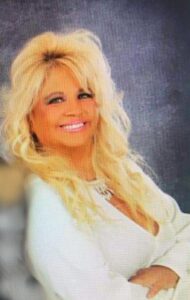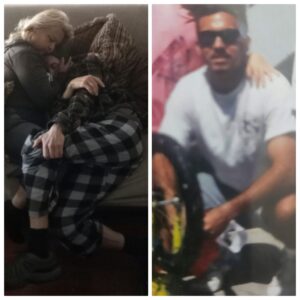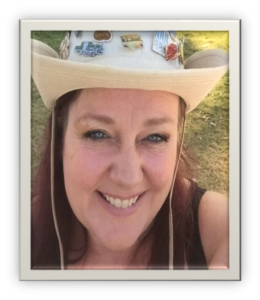HD Shakers and Movers:


A Voice for Huntington’s Disease Family - Written by Leslie Oliva Frias
Testimony Before U.S. Senate and President Clinton on Nursing Home Abuse, 1998
Huntington's Disease is a devastating disease that breaks the hearts of many families. I learned about HD when I was 12 years old. My Grandmother, Jacklyn Soto, was a victim of HD. I helped my mother take care of her until she passed away. Then my uncle Joe showed up at our home. Again, I took care of my uncle Joe until he passed away from HD. My mother started showing symptoms of HD. I remember sitting in the doctor's office listening to their conversation about HD. I hugged Mom as she cried, she said, I'm going to die.” I cried with my mother and knew I had to take action fast to help my mother live.
I joined the HDSA L.A. group as patient advocate. I was asked to lobby the White House for HD nursing home care. During my advocacy, along with participation in many support group meetings, Mom became more symptomatic and totally depended on me. My sisters, who had little knowledge about HD placed our mother in a nursing home where the nursing staff had never heard of Huntington’s disease and had experienced in the specialized care of an HD patient – none at all!
Being alone, my mother was a victim of severe abuse that eventually took her life. Her erratic chorea was misinterpreted as lashing out, and they responded by violently attacking and repeating her. The abuse took her life.
As patient advocate, I reached out to my contact, Jason W., Attorney at Law. I proceeded to send letters to The United States Senate Special Committee on Aging and included photos of my mother and her wounds. I told them I and the HD Community needed help was a Advocate for HD and appealed for their help. After several months my attorney called to tell me he received a letter from Washington D.C requesting that I testify before the U.S. Senate regarding nursing home abuse and Huntington’s disease.
I accepted the U.S. Senate request and attended, along with my son Mikeal James Oliva who was 8 years old at the time, and expecting my second child, my daughter Bridget. As we sat before the Senate and spoke about Huntington’s disease and the abuse that our innocent and helpless HD patients continue to endure in the hands of nursing home employees. Photos of my mother were exhibited on a giant screen for the Senate while I testified. President Clinton asked me about the symptoms, and I stood up and said, “ I advised President Clinton. Their hurting our families in these nursing homes. I lost my mother to her death because the stuff are not educated to take care of a HD patients. Clinton asked me what are the symptoms.
I stood up and said, “Sir, Huntington's disease is a genetic brain disorder that causes brain cells to break down, resulting in a variety of symptoms that worsen over time. We need your help.” I went on to describes the cognitive and physical symptoms and how it causes uncontrollable movements which are often interpreted as lashing out. I finished testifying by addressing the President directly. “ Sir, we need laws to protect all individuals going into a nursing home, Mr. President.” President Clinton then asked me to come up with 10 said, Come up with 10 new regulations recommendations, and that they would review them. Two weeks later I received a letter from the White House informing me that President Clinton had put into law all eight (8) recommendations that I had provided him with. The laws strictly enforced in compliance with laws and regulations.
IMPROVING THE QUALITY OF NURSING HOME CARE
Moving a parent to a nursing home is one of life's most difficult decisions. But with these steps, we are giving families the security of knowing that we are doing everything we can to make our nation's nursing homes safe and secure.
President Bill Clinton
July 21, 1998
New Administrative Actions To Improve The Quality Of Nursing Homes.
Today, the President is also announcing the implementation of new penalties, inspections, and tougher oversight of nursing homes by the HCFA, including:
- Nursing Homes To Conduct Criminal Background Checks On All Potential Employees;
- The Establishment Of A National Abuse Registry To Keep Track Of Those Convicted Of Abusing Residents;
- Improving Nutrition and Hydration Therapy By Allowing More Categories Of Nursing Home Employees To Perform These Functions
- Reauthorization Of The Nursing Home Ombudsman Program Run By The Administration On Aging.
- Immediate Civil Monetary Penalties Against Nursing Homes That Violate Federal Standards;
- Tougher Nursing Home Inspections, including: (1) Staggered survey times to prevent inadequate nursing homes from preparing for inspections; (2) Targeting nursing home chains with bad records; (3) Cooperative efforts with the HHS Office of the Inspector General and the Department of Justice to refer severe violations of quality care standards for criminal investigation and prosecution where appropriate;
- Stronger Federal Enforcement Of State Nursing Home Oversight and tougher actions against those states that are failing to enforce standards. The HCFA will: (1) Terminate federal nursing home inspection funding to states with consistently poor records; (2) Increase oversight of state inspections; (3) Ensure that nursing homes are in compliance with standards before lifting sanctions;
- Publishing Nursing Home Survey Results On The Internet;
- Preventing Bed Sores, Dehydration, and Malnutrition by requiring state surveyors to monitor actions taken by nursing homes to prevent these ailments
Implementing New Efforts To Measure And Monitor Nursing Home Quality. This month, the HCFA began collecting information on resident care through a national automated data system that will be analyzed to identify potential areas of inadequate care in nursing homes and to assess performance in critical
CNN article spotlighting Leslie Frias: https://www.cnn.com/ALLPOLITICS/1998/07/27/time/health.care.html
Shining A Light On Abuse – TIME article
https://content.time.com/time/subscriber/article/0,33009,988825,00.html
-------------------------------------------------------------------------------

The HD Brainstormers - Written by Melora Rini
Thirty six years ago at the age of 19, I attended my first HD Support Group. The support groups were still relatively “new” at that time. I sat down in a large room full of people. All affected by HD. Whether they were Caregivers, at risk, symptomatic or newly tested positive, and those that came in support of them. I attended two of these groups and knew that my needs as a young adult at risk for Huntington’s Disease would not be met. How was I supposed to talk about being angry about being at risk and how scared I was to die this way in front of my HD affected mother and my dad. Both of whom were unable to discuss their feelings of guilt for having potentially passed it on in front of me. I approached the woman who was running the group and explained my feelings. The next month we had facilitators and the At Risk were able to have their voices heard in a “safer” environment.
There was another young lady, Carrie Statkus, that had attended both of those meetings, she was a few years older and also at risk. We connected immediately and were each other’s support and the only at risk in attendance at these support group meetings. Slowly more at risk began to join the group and we started to see a great need. At Risk individuals are not only dealing with their fear and anger about the disease itself, there were at risk committing suicide, there was a fear of birthdays because it was just another step closer to the inevitable. And I say inevitable because everyone At Risk approaches their life like they WILL get sick. On top of the personal issues relating directly to being At Risk we were caregivers to the very person who and potentially passed it on to us. Our little group of At Risk was drowning in their responsibilities and fears.
It was at that time myself, Carrie Statkus and Jennifer Caviston Jones formed the HD Brainstormers. Our goal to make HD more livable for those suffering directly and for those At Risk. We were quickly joined by Angelita Frias, Diane Brock and Kristen McQuade. All and risk and all of us just kids but we knew we needed to effect some change. We had plans to help the affected experience things like driving again even if it was at Autotopia or a deep sea fishing event. And of course to bring some kind of community and safe space to those At Risk. We started with the STAR Retreat (STAR - Spending Time At Risk) this would be an experience that they would hopefully walk away from with some hope and a sense of community. We provided Genetic Counselors, Neurologists, mini discussion groups on topics like suicide and birthdays, as well as accommodations and food. We were able to host three of the STAR Retreats at the Bass Lake Resort, The Pines before the Brainstormers needed to take a break to deal with their immediate issues with their affected loved ones. Shortly after the third and final annual retreat The National Youth Alliance was born. We like to think that our hard work helped to spur that amazing program. The Brainstormers came together again several years later and walked as a team in the Hope Walks.
I hope that our efforts made a difference for many. I hope for peace and love for the families effected.
I have written this in honor of the memories of Jennifer Caviston Jones and Angelita Frias, both have competed their battle and are now at peace.
Melora Rini
